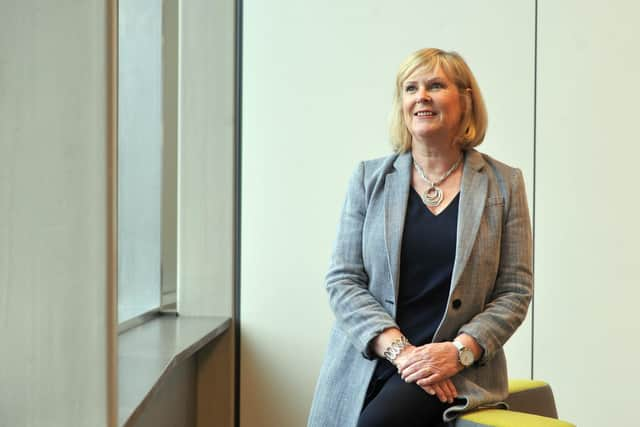Screen Yorkshire chief executive Sally Joynson says the lack of skilled workforce is holding back the TV and film industries in the North
and live on Freeview channel 276
Screen Yorkshire chief executive Sally Joynson told an online event that northern production companies were having to turn away work despite "producing so much young talent every year".
She said the region needed more than simply the arrival of Channel 4 in Leeds to ensure young people were able to get a foothold in the industry, which has gone from strength to strength in Yorkshire in recent years.


Advertisement
Hide AdAdvertisement
Hide AdMs Joynson was speaking at an online event organised by the Northern Culture Club, a cross-party group of MPs examining what northern culture needs to rebuild, rebalance and recover from the pandemic.
At the same event West Yorkshire mayor Tracy Brabin described the proposed privatisation of Channel 4, whose new headquarters is in Leeds, as a "levelling up disaster" that threatened the broadcaster's unit remit.
But Lord Mendoza, the Government's Commissioner for Cultural Recovery and Renewal, defended Ministers' commitment to culture in the North and pointed out a quarter of the Government's Culture Recovery Fund went to the region.
Ms Joynson, whose organisation is one of nine regional screen agencies set up in 2002, is credited with helping Yorkshire & Humber become one of the most sought-after destinations for production in the UK.
Advertisement
Hide AdAdvertisement
Hide AdShe told the event that creating new infrastructure like the new Channel 4 HQ in Leeds or MediaCity in Salford was "only part of the story" and that skills were vital.
She said initiatives like paid placements, mentoring and flexible foundation schemes were necessary to ensure young people from non-traditional backgrounds were able to work in TV, film or digital.
"The most important thing about having production in the regions is that people see it happening on their doorstep. Why on earth would you think that this is an industry for you to work in, if it involves moving to the other end of the country or abroad.
"What relevance, what association does it have with you if you come from those non traditional backgrounds. That's why having production is not only important economically, it's massively important as a way of driving ambition and aspiration.
Advertisement
Hide AdAdvertisement
Hide Ad"So having it on the ground in places like Yorkshire, Batley, Dewsbury, Barnsley, all of those places, Grimsby Hull, Scunthorpe, it's massively important that it takes place there.
"So what you do then is that you invest heavily in the skills, and you invest heavily in the skills of those underrepresented communities."
She added: "And what is so sad at the moment, is that we have such buoyant screen industries in this country. But the greatest barrier to growth in the North of England, and I can say this, having spoken to colleagues in Manchester, Salford and the North East, is the lack of the skilled workforce.
"We now have companies turning business away, turning away commissions because they can't get the workforce. And yet we are producing so much young talent every year.
"So if you want to retain that talent, you have to give them the activity on the ground and you have to give them access and opportunity and openings to join us."
Comment Guidelines
National World encourages reader discussion on our stories. User feedback, insights and back-and-forth exchanges add a rich layer of context to reporting. Please review our Community Guidelines before commenting.
